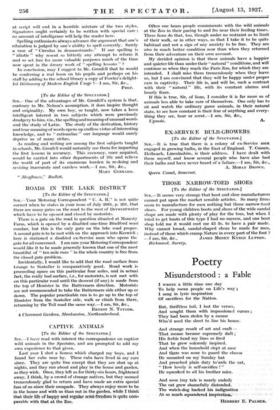CAPTIVE ANIMALS [To the Editor of the SPECTATOR.] have read
with interest the correspondence on captive wild animals in the Spectator, and am prompted to add my own experience to that given.
Last year I shot a lioness which charged my boys, and I found her cubs near by. These cubs have lived in my care since. They are quite free except that they are shut up at nights, and they run about and play in the house and garden, as they wish. Once, they left us for thirty-six hours, frightened away, I think, by a crowd of strange natives, but they seemed tremendously glad to return and have made an extra special fuss of us since their escapade. They always enjoy more to be in the house and with us than out in the garden, while I think that their life of happy and regular sent-freedom is quite corn•
parable with that at the Zoo. Often one hears people commiserate with the wild animals at the Zoo in their pacing to and fro near their feeding times. These lions do that, too, though under no restraint as to limit of their walk, or in other ways, so that I take it to be quite habitual and not a sign of any anxiety to be free. They are also in much better condition now than when they returned from their adventure on their own account.
My decided opinion is that these animals have a happier and quieter life than under their " natural" conditions, and will continue so when they reach the Paris Zoo, for which they are intended. I shall miss them tremendously when they leave us, but I am convinced that they will be happy under proper care in captivity. Their life is, and will be, such a contrast with their " natural " life, with its constant alarms and hourly fears.
If this is true, Sir, of lions, I consider it is far more so of animals less able to take care of themselves. One only has to sit and watch the ordinary game animals, in their natural state, to see how constant is their fear of anything and every- thing they see, hear or scent.—I am, Sir, &c.,






























 Previous page
Previous page